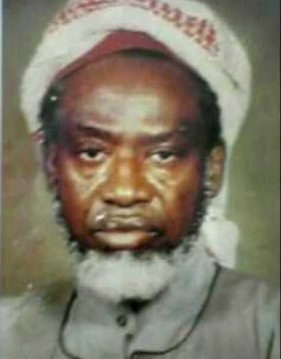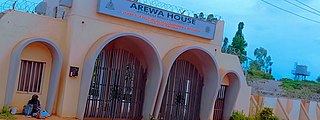
The Sokoto Caliphate ; Fula; Lamorde sokkoto;, also known as the Fulani Empire or the Sultanate of Sokoto, was a Sunni Muslim caliphate in West Africa. It was founded by Usman dan Fodio in 1804 during the Fulani jihads after defeating the Hausa Kingdoms in the Fulani War. The boundaries of the caliphate are part of present-day Cameroon, Burkina Faso, Niger, and Nigeria. It was dissolved when the British and Germans conquered the area in 1903 and annexed it into the newly established Northern Nigeria Protectorate and Kamerun respectively.

Islam is the largest religion in Nigeria and the country has the largest Muslim population in Africa. In 2023, the CIA World Factbook estimated that 53.5% of Nigeria's population is Muslim. Islam is predominantly concentrated in the northern half of the country, with a significant Muslim minority in the southern region. Islam was introduced to what is now Nigeria during the 11th century via trade routes with North Africa and the Senegalese basin, and it was the first monotheistic Abrahamic religion to arrive in Nigeria. Christianity was later introduced in the 15th century by Portuguese missionaries, and grew to be a dominant religion alongside Islam. Muslims in Nigeria are predominantly Sunnis of the Maliki school of thought. However, there is a significant Shia minority, primarily in Kaduna, Kano, Katsina, Osun, Kwara, Yobe and Sokoto states. In particular, A 2008 Pew Forum survey on religious diversity identified 5% of Nigerian Muslims as Shia. The Ahmadiyya movement also has a sizeable presence in the country.

Ahmadu Ibrahim Bello(listen), Sardauna of Sokoto, knighted as SirAhmadu Bello, was a conservative Nigerian statesman who masterminded Northern Nigeria through the independence of Nigeria in 1960 and served as its first and only premier from 1954 until his assassination in 1966, in which capacity he dominated national affairs for over a decade.

Islam in Africa is the continent's second most widely professed faith behind Christianity. Africa was the first continent into which Islam spread from Southwest Asia, during the early 7th century CE. Almost one-third of the world's Muslim population resides in Africa. Muslims crossed current Djibouti and Somalia to seek refuge in present-day Eritrea and Ethiopia during the Hijrah to the Christian Kingdom of Aksum. Like the vast majority (90%) of Muslims in the world, most Muslims in Africa are also Sunni Muslims; the complexity of Islam in Africa is revealed in the various schools of thought, traditions, and voices in many African countries. Many African ethnicities, mostly in North, West and East Africa consider Islam their Traditional religion. The practice of Islam on the continent is not static and is constantly being reshaped by prevalent social, economic, and political conditions. Generally Islam in Africa often adapted to African cultural contexts and belief systems forming Africa's own orthodoxies.

Islam in Niger accounts for the vast majority of the nation's religious adherents. The faith is practiced by more than 99.3% of the population, although this figure varies by source and percentage of the population who are classified as Animist. The vast majority of Muslims in Niger are Malikite Sunni with Salafi influences. Many of the communities who continue to practice elements of traditional religions do so within a framework of syncretic Islamic belief, making agreed statistics difficult. Islam in Niger, although dating back more than a millennium, gained dominance over traditional religions only in the 19th and early 20th centuries, and has been marked by influences from neighboring societies. Sufi brotherhoods have become the dominant Muslim organization, like much of West Africa. Despite this, a variety of interpretations of Islam coexist—largely in peace—with one another as well as with minorities of other faiths. The government of Niger is secular in law while recognising the importance of Islam to the vast majority of its citizens.
Ibrahim Muhammadu Maccido dan Abubakar, often shortened to Muhammadu Maccido, was the 19th Sultan of Sokoto in Nigeria. He was the son and primary aide to Siddiq Abubakar III (1903–1988) who had been the Sultan of Sokoto for 50 years.

Muhammadu Sa'ad Abubakar, CFR is the 20th Sultan of Sokoto. As Sultan of Sokoto, he is considered the spiritual leader of Northern Nigeria's Muslims.
Alhaji Sir Usman Nagogo dan Muhammadu Dikko was Emir of Katsina from 19 May 1944, until his death. A Fulani from the Sullubawa Clan, he succeeded his father, Muhammadu Dikko, as Emir, and was succeeded by his son, Muhammadu Kabir Usman.

Abubakar Mahmud Gumi was a Nigerian Islamic scholar and Grand Khadi of the Northern Region of Nigeria (1962–1967), a position which made him a central authority in the interpretation of the Shari'a legal system in the region. He was a close associate of Ahmadu Bello, the premier of the Northern region in the 1950s and 1960s and became the Grand Khadi in 1967, the position was abolished.
Northern People's Congress (NPC) is a political party in Nigeria. Formed in June 1949, the party held considerable influence in the Northern Region from the 1950s until the military coup of 1966. It was formerly a cultural organization known as Jamiyaar Mutanem Arewa.
Abba Musa Rimi CON is a Nigerian politician who was elected Deputy Governor of Kaduna State, Nigeria in October 1979 during the Nigerian Second Republic, becoming acting governor when the Governor Abdulkadir Balarabe Musa was impeached on 23 June 1981. He was elected on the platform of the People's Redemption Party.

The Vanguard for the Protection of Muslims in Black Africa, better known as Ansaru and less commonly called al-Qaeda in the Lands Beyond the Sahel, is an Islamic fundamentalist Jihadist militant organisation based in the northeast of Nigeria. It originated as a faction of Boko Haram, but became officially independent in 2012. Despite this, Ansaru and other Boko Haram factions continued to work closely together until the former increasingly declined, and stopped its insurgent activities in 2015. Since then, Ansaru is mostly dormant though its members continue to spread propaganda for their cause.
Islamic extremism is adherence to a fundamentalist interpretation of Islam, potentially including the promotion of violence to achieve political goals. In contemporary times, Islamic extremism in Northern Nigeria is typified by the Boko Haram insurgency and the proselytizing campaigns of salafist groups such as the Izala Society.
Ibrahim Dasuki was the 18th Sultan of Sokoto, who was deposed in 1996 during the military government of Sani Abacha. Prior to becoming Sultan, he held the traditional title of Baraden Sokoto. Dasuki was the first Sultan from the Buhari line of the house of Dan Fodio. He was a close associate of Ahmadu Bello, a friend of Abubakar Gumi and was influential in the founding of Jama'atu Nasril Islam.

Arewa House is centre for research and historical documentations under Ahmadu Bello University, Zaria, located in Kaduna, Kaduna State, in Northwest Nigeria. It is also serves as a center for historical documentation and research of the Ahmadu Bello University, Zaria, Nigeria. Dr Shuaibu Shehu Aliyu is the current Director of the House.
Aliyu Makama Bida (1905–1980), MHA, CMG, CFR, OBE, CBE, was a Nigerian politician. He was the first Northern Minister of Education and Social Welfare, and later Minister of Finance and Treasurer of the NPC.
JNI is the Java Native Interface, a Java programming framework.
Islamic Education Trust is an Islamic Non-Governmental Organization established on 16th Ramadan 1379AH equivalent to 18th November 1969 and registered with the Federal Government of Nigeria in 1972 situated in Minna, Nigeria.
The Nigerian Supreme Council for Islamic Affairs (NSCIA) is the apex Islamic authority in Nigeria. It was established in 1973 to "cater for, preserve, protect, promote and advance the interest of Islam and Muslims throughout the country" and has been responsible for the unity of Nigerian Muslims as the official body, recognised by the Nigerian Federal and State Governments, coordinating the affairs of Islam in Nigeria. The NSCIA is headquartered at the Abuja National Mosque Office Complex, Central Business District, Abuja, Nigeria. The organisation is, inter alia, responsible for the official announcement of commencement and termination of the Ramadan fast or moon sighting in Nigeria.
Abdulkadir Orire was a legal scholar, researcher, community leader, and development activist. He was the first Grand Khadi of the Kwara State Sharia Court of Appeal, in Nigeria.






